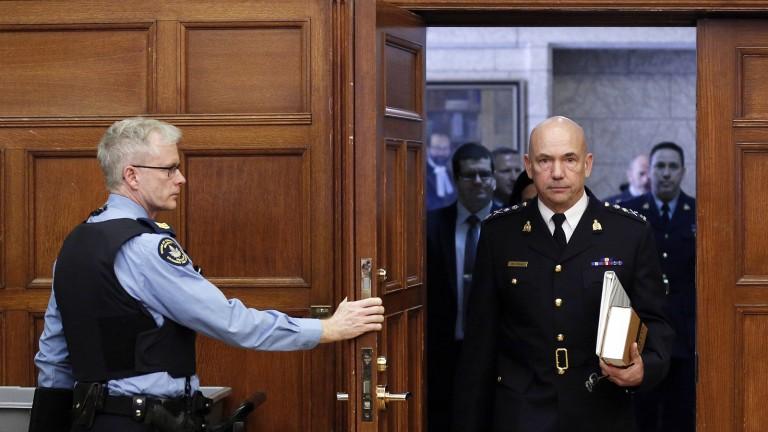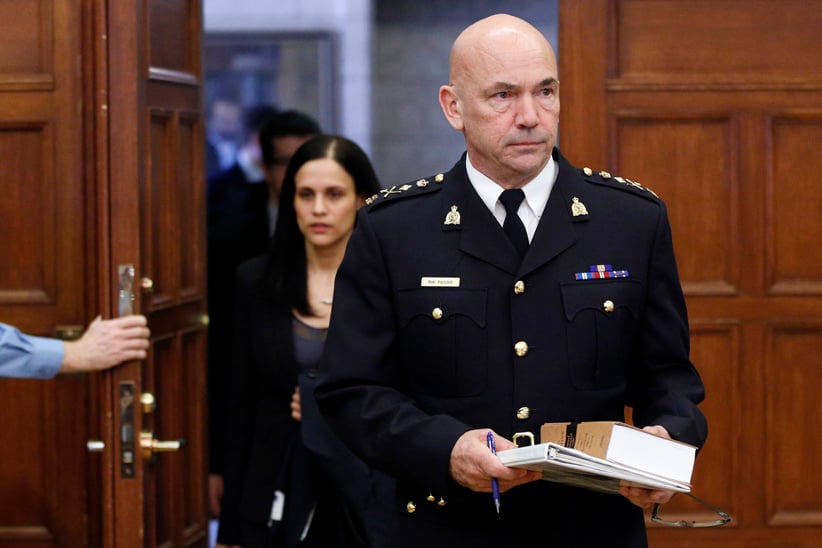The RCMP’s latest harassment complainant?
Charlie Gillis on why Canada’s top Mountie may be recalled to testify at one of the force’s messiest trials.

Royal Canadian Mounted Police Commissioner Bob Paulson prepares for a public safety committee meeting on Parliament Hill in Ottawa March 6, 2015. Paulson is expected to show the video Michael Zehaf-Bibeau made before carrying out his attacks. Blair Gable/Reuters
Share

The year-long workplace harassment case of Sgt. Peter Merrifield was already one of the messiest ever waged against the RCMP—a legal odyssey featuring revelations of a senior Mountie caught in a john sweep, and leaks from the special unit guarding the prime minister that were hastily sealed from public view.
Commissioner Bob Paulson himself was summoned last winter to testify at Merrifield’s civil trial over nasty remarks he’d made about Merrifield in 2013 before a Senate standing committee.
But if you thought this 10-year saga had exhausted its quota of bizarre twists, you’d be wrong. When the trial resumed on Monday in Newmarket, Ont., Merrifield’s lawyers revealed the 49-year-old sergeant has, himself, been accused of harassment.
And the target of his allegedly terrorizing behaviour?
Bob Paulson.
“In the context of this trial, it suggests to us nothing more than retaliatory harassment of our client,” said John Phillips, one of Merrifield’s counsel, outside the courtroom. “It’s continued through this trial and, frankly, up until now.”
The little trial turned RCMP tire fire: How we got here
According to court documents filed on Monday, the accusation arises from a joke Merrifield cracked on June 24 to fellow officers. It happened during a seminar on assessing the psychological states of suspects or informants, when the officer in charge encouraged participants to name people in charge of large organizations they thought showed psychopathic tendencies.
Witnesses at the session say Merrifield called out, “Paulson,” before adding: “I’m joking. Just a joke.”
But one officer at the seminar took offence on the commissioner’s behalf, and filed a third-party harassment complaint. Merrifield learned of the complaint in October, Phillips says, when he was informed that Paulson was now the principal complainant.
On Monday, Merrifield’s lawyers notified the court they’ll move to reopen their client’s case so they can recall the commissioner as a witness.
“Number one, something like this is not a harassment issue inside an organization,” said Phillips. “If you’re going to treat every joke made about every member as a harassment issue, you’re not going to have a force left.” Second, argued Phillips, the complaint didn’t follow RCMP policy, which stipulates third-party complaints can only be levelled on a member’s behalf if that member is ill or unable to file it him or herself.
Phillips’s motion is to be heard on Tuesday. Sean Gaudet, the justice department lawyer representing the Mounties, said the feds will call an officer who oversees harassment policy to respond.
The idea of the head of the RCMP, himself, experiencing workplace harassment might sound risible. But if it were to emerge in any proceeding, it would be this one. Merrifield, an 18-year veteran of the force, has alleged workplace harassment, abuse of authority and cover-ups on the part of his senior officers dating back to 2005. It was then, his lawsuit claims, that a handful of his direct commanders took exception to his decision to stand for the federal Conservative nomination in Barrie, Ont., and accused him of failing to obtain the proper leave without pay.
Merrifield lost the nomination, but alleges his bosses had by then embarked on a campaign of harassment, opening four code-of-conduct investigations against him in secret, none of which resulted in discipline.
The harassment, his suit says, pushed him out of plum assignments he believed he’d earned, including a spot on the threat assessment group of INSET, the elite national security unit tasked with keeping the country safe from terrorists.
The counteraccusation on behalf of Paulson is relevant on a number of levels. For starters, it suggests bad blood on the part of the commissioner toward Merrifield, which may date to before the current trial. When he testified in December, Paulson claimed not to have known much about Merrifield and was worried that an otherwise productive and talented officer had become “irretrievably embittered.”
But what Paulson knew, and when he knew it, fell under scrutiny last spring, when the issue of the officer soliciting prostitutes arose. Merrifield had raised the issue before the Senate committee in May 2013, saying the officer involved, Superintendent (ret’d) Marc Proulx, was never disciplined. He has cited it as evidence that the RCMP’s commissioned officers protect their own, while using harassment procedures to drive non-commissioned officers they don’t like out of the force.
The commissioner had ridiculed the allegation in his appearance before the Senate standing committee in 2013. He also professed no knowledge of it when shown a report from city police in London, Ont., confirming that Proulx had indeed been picked up in the sting.
But one of his closest lieutenants, Assistant Commissioner Steven White, later testified that RCMP brass knew about it as early as January 2012, and that he discussed it with Paulson at that time.